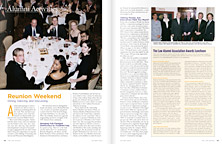The Art of the Deal
Why real estate is more than just numbers
Printer Friendly Version“You’ve got to like the deal,” said Alan Pomerantz (’68), describing the key to success for any real estate lawyer. “The deal has to be more important than anything else.”
Pomerantz, a partner at Weil, Gotshal & Manges, was one of the most influential real estate attorneys in the country to offer his secrets for success at a panel on “Careers and Trends in Real Estate Law,” sponsored by the NYU School of Law’s Real Estate and Urban Policy Forum and the Andrew (’92) and Justin (’96) Segal Real Estate Forum. Pomerantz also encouraged students to learn economics, but to study it in a way that emphasizes psychology over charts. “Understanding why people do what they do is essential to representing people in real estate,” he said.
Professor Michael Schill, then the Wilf Family Professor of Property Law and director of the Furman Center for Real Estate and Urban Policy and now the dean of UCLA School of Law, moderated the event, where panelists discussed the ins and outs of real estate legal work in New York City.
Jonathan Mechanic (’77), a partner and head of the real estate department at Fried, Frank, Harris, Shriver & Jacobson, praised his alma mater’s real estate curriculum and explained his reasons for pursuing real estate law. “If you like walking around the city of New York—and I love it—there’s just no other practice of law where you can walk down the street and see different projects that you had some involvement in.” Mechanic also discussed his recent project representing the buyer of the GM Building, which was sold for $1.4 billion, a record-breaking price.
Ross Moskowitz (’84), a partner at Stroock & Stroock & Lavan, noted that students’ choice of the NYU School of Law was an enormous step toward success in real estate work. “The Law School has one of the best real estate curriculums around.” He added that his love of the city also influenced his choice. “I became a real estate lawyer because you can smell it, you can touch it, you can feel it.”
Moskowitz discussed a real estate transaction familiar to students: the new Law School building. He explained the different stages of the deal—understanding the zoning laws, negotiating with neighbors, securing tax-exempt financing, responding to a lawsuit filed to stop construction, and settling the lawsuit.
Meredith Kane, a partner at Paul, Weiss, Rifkind, Wharton & Garrison and a graduate of Harvard Law School, and Jennifer McCool, an associate at Schulte Roth & Zabel and graduate of New York Law School, also participated in the panel.
“Tell the assigning partners what you want to do, what you haven’t done yet,” said Kane. “Almost every law firm will take the opportunity to develop you into a wellrounded lawyer.” McCool added that young lawyers should attend seminars whenever possible. “If you’re the youngest face in the room, then good for you,” she said.
The panel was organized by Nicholas Bagley (’05) and Joshua Babbitt (’05), co-chairs of the Real Estate and Urban Policy Forum, a Law School student organization that connects students to New York City’s real estate and urban economicdevelopment worlds.
